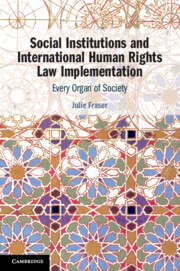
- Cited by 4
-
Cited byCrossref Citations
This Book has been cited by the following publications. This list is generated based on data provided by Crossref.
Fortin, Katharine 2022. The Procedural Right to a Remedy When the State has Left the Building? A Reflection on Armed Groups, Courts and Domestic Law. Journal of Human Rights Practice, Vol. 14, Issue. 2, p. 387.
Ramesh, Sangaralingam 2022. The Political Economy of Human Behaviour and Economic Development. p. 43.
Fraser, Julie 2023. Rediscovery and Revival in Islamic Environmental Law: Back to the Future of Nature's Trust, by Samira Idllalène Cambridge University Press, 2021, 200 pp, £85 hb, £20 pb, US$30 ebk ISBN 9781108488785 hb, 9781108738842 pb, 9781108809658 ebk. Transnational Environmental Law, Vol. 12, Issue. 2, p. 451.
Miaz, Jonathan Schmid, Evelyne Niederhauser, Matthieu Kaempfer, Constance and Maggetti, Martino 2024. Engaging with Human Rights. p. 1.
- Publisher:
- Cambridge University Press
- Online publication date:
- September 2020
- Print publication year:
- 2020
- Online ISBN:
- 9781108777711
- Subjects:
- Public International Law, Law, Human Rights


